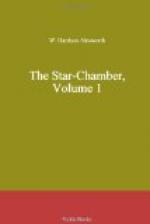The boon, however, was accepted by the majority of the people in the spirit in which it was offered, and the licence afforded them was but little abused. Perfect success, indeed, must have attended the benign measure, had it not been for the efforts of the Puritanical and Popish parties, who made common cause against it, and strove by every means to counteract its beneficial influence: the first because in the austerity of their faith they would not have the Sabbath in the slightest degree profaned, even by innocent enjoyment; the second, not because they cared about the fancied desecration of the Lord’s day, but because they would have no other religion enjoy the same privileges as their own. Thus sectarianism and intolerance went for once hand in hand, and openly or covertly, as they found occasion, did their best to make the people dissatisfied with the benefit accorded them, trying to persuade them its acceptance would prejudice their eternal welfare.
Such arguments, however, had no great weight with the masses, who could not be brought to see any heinous or deadly sin in lawful recreation or exercises after divine service, always provided the service itself were in no respect neglected; and so the King’s decree prevailed over all sectarian opposition, and was fully carried out. The merry month of May became really a season of enjoyment, and was kept as a kind of floral festival in every village throughout the land. May-games, Whitsun-ales, Morrice-dances, were renewed as in bygone times; and all robust and healthful sports, as leaping, vaulting, and archery, were not only permitted on Sundays by the authorities, but enjoined.
These preliminary remarks are made for the better understanding of what is to follow.
We have already stated that long before Jocelyn and his companion reached Tottenham, they were made aware by the ringing of bells from its old ivy-grown church tower, and by other joyful sounds, that some festival was taking place there; and the nature of the festival was at once revealed, as they entered the long straggling street, then, as now, constituting the chief part of the pretty little village, and beheld a large assemblage of country folk, in holiday attire, wending their way towards the green for the purpose of setting up a May-pole upon it, and making the welkin ring with their gladsome shouts.
All the youths and maidens of Tottenham and its vicinity, it appeared, had risen before daybreak that morning, and sallied forth into the woods to cut green boughs, and gather wild—flowers, for the ceremonial. At the same time they selected and hewed down a tall, straight tree—the tallest and straightest they could find; and, stripping off its branches, placed it on a wain, and dragged it to the village with the help of an immense team of oxen, numbering as many as forty yoke. Each ox had a garland of flowers fastened to the tip of its horns; and the tall spar itself was twined round with ropes of daffodils, blue-bells, cowslips, primroses, and other early flowers, while its summit was surmounted with a floral crown, and festooned with garlands, various-coloured ribands, kerchiefs, and streamers. The foremost yokes of oxen had bells hung round their necks, which they shook as they moved along, adding their blithe melody to the general hilarious sounds.




